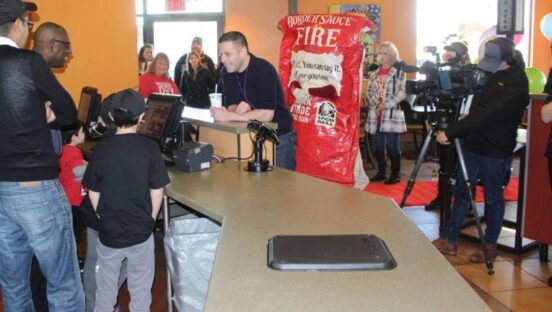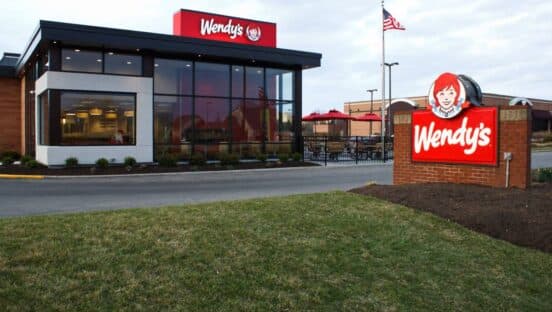Judd Wishnow is a lefty, but that’s not why his quick-service franchising company is called Southpaw.
It’s about the coming together of him and his wife, Erica Spector Wishnow, who he met in 2009 during the Great Recession. Judd likens the fateful meetup to the movie “Rocky,” which tells the story of a southpaw boxer who was seemingly aimless until he met Adrian, the love of his life. Judd worked at Goldman Sachs while Erica was at Deutsche Bank, but both felt lost. Their introduction created a bolt of energy and sparked a rise that neither would have reached otherwise. Similar to what Adrian did for Rocky, Judd and Erica made each other a more complete person.
It’s with that momentum—a mixture of drive, excitement, and adventure—that the two decided to buy 11 Dunkin’ stores in New York’s Hudson Valley. It was an acquisition Judd believed in because of the concept’s apparent resilience to one of the worst economic crises in U.S. history.
“We’ve always said that our first baby was Southpaw, before we we were a unit,” Judd says. “In 2010, we had those stores. We were very ambitious. We wanted to grow. We’ve made every mistake in the book because we had no experience. The good news is we rarely make the same mistake twice. So we’ve become what I believe are very good operators. Basically by learning from our own mistakes. You don’t necessarily want either of us in the back of house. We’re smart enough to know that we are not very good at a lot of things required in the back house, but we’re good at finding really incredible people that are much better than us at what we need done.”
Southpaw hired operators early on to allow the Wishnows to focus on growth opportunities—organically and via M&A. A few years down the road, when the franchisee was at roughly 23 Dunkin’ shops, Judd suggested the idea of looking at Taco Bell to keep the company from stagnating. He was hooked on the Mexican chain because of its value-oriented business model and cult-like following aided by clever marketing. He saw the brand as a survivor of any environment, just like he did with Dunkin’.
The fast-food operator entered Taco Bell’s franchise community by building stores in Hudson Valley and that’s because the restaurant wouldn’t let the franchisee buy anything. After opening locations, Southpaw continued to beg Taco Bell to allow it to acquire some corporate units. The company received its wish at the start of 2018 when it closed on 24 locations in the Louisville market.
From there, Southpaw was off to the races. After buying nearly 40 Taco Bells in the Greater Atlanta market this year, the company stood at 115 stores across five states and approximately 65 or so Dunkin’ units in three states. Combined, Southpaw earns more than $300 million annually. This recent move comes after the franchisee bought 34 Mid-Atlantic Taco Bell locations in December 2021.
Judd says Taco Bell has been nothing short of a goldmine. Southpaw loves the chain so much that it’s fairly agnostic when it comes to geography. Having said that, the company wants to focus on the Midwest, Southeast, and Southwest for expansion opportunities.
“I can’t imagine a brand right now operating more effectively than Taco Bell,” Judd says. “It’s just the combination of an incredible franchisee base. The franchisor is best in class in terms of marketing and menu innovation and the margins are just incredible. So we’ve become very, very enamored with the Taco Bell brand and haven’t been shy about the fact that if the brand would allow us, we would love to become one of the biggest players in their system. So hopefully we will continue to operate at the highest level and the brand will continue to allow us to grow.”
Looking ahead, Southpaw wants to expand in Dunkin’ and Taco Bell, but the latter is the priority because of its performance. To Judd’s point, Taco Bell’s U.S. same-store sales grew 9 percent in Q1 year-over-year, and system sales lifted 11 percent. He also notes that franchisees can grow more quickly and efficiently with Taco Bell since it’s harder to find Dunkin’ acquisition opportunities in the range of 30–50 shops. But those arrangements exist within Taco Bell’s circles. In terms of Atlanta specifically, Judd is optimistic about development in the market because of its business-friendly nature and white space availability. Judd adds that Southpaw has a “really nice” pipeline in the Mid-Atlantic, it’s just that the opening process—from securing a site to breaking ground—can take longer.
When it comes to prototypes—something Taco Bell is particularly known for, like its incomparable Defy concept—Southpaw is more than willing to be guinea pigs. The company hasn’t opened a Taco Bell Cantina because of difficulty obtaining liquor licenses, but it has tested slimmer drive-thru units with limited seating. Judd says the store design has been beneficial in areas with higher crime rates. Southpaw has seen “massive” sales upside in these locations.
“We want to take no chance and want people to know that we’re supporting them,” Judd says.
“So there have been multiple occasions where we have to do a remodel on an existing store in an area that has a high crime rate. And instead of doing a traditional remodel, we’ve done a much more expensive knock the building down, scrape and rebuild, drive-thru only or very limited seating where the team or the staff are so much safer.”
If Southpaw were to venture into more quick-service concepts, it would first depend on what Taco Bell has to say. The chain has a lot of control over what brands franchisees cane be part of. Judd wouldn’t want to be under more than three restaurant chains anyway, and right now, he can’t think of another franchisor he would prefer putting his money in. He doesn’t doubt that one day he may change his mind. It may be a business outside of restaurants so Southpaw is unrestricted on its choices.
Aside from purchasing locations, the franchisee company is building its pipeline “pretty aggressively,” Judd says. He estimates around 25-30 units are somewhere in the development process, whether that’s signing the LOI or actual construction. Given the current base of stores, his ideal growth rate is 5–10 percent per year.
“We will put stores in every corner we can find because so far it’s been a very, very big part of our strategy and it’s paid very handsome dividends,” Judd says.









